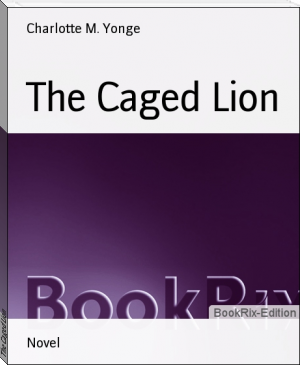The Caged Lion by Charlotte M. Yonge (best short novels of all time TXT) 📗

- Author: Charlotte M. Yonge
Book online «The Caged Lion by Charlotte M. Yonge (best short novels of all time TXT) 📗». Author Charlotte M. Yonge
And then it was that all Malcolm had learnt of the true spirit of the Christian triumphed—not only over the dark Keltic spirit of revenge, but over the shuddering of a tender and pitiful nature. Where no other priest durst venture, he went. Through all the frightful and protracted sufferings of Athol, Graham, Hall, and the rest, it was Malcolm Stewart who, never flinching, prayed with and for them; gathered their agonized sobs of confession, or strove to soften their hardness; spoke the words of absolution, and commended their departing souls.
When he awoke from the long unconsciousness and delirium that ensued upon the force he had put on himself, he found himself tended by his sister at Glenuskie. Patrick Drummond had transported him thither; finding that the angry Queen, in the madness of her vindictiveness, was well-nigh disposed to connect him with the treasonable designs of Athol and Graham. He slowly and partially recovered, but his influence was gone; the Queen would not brook the sound of his name, the little king was beyond his reach, James Kennedy was biding his time, and the country was returned to its state of misrule and violence, wherein an individual priest could do little: yet Malcolm would have held by his post, had not his health been so utterly shattered that he was incapable of the work he had hitherto done, as a confessor and a preacher. And therefore, as the state of his beloved King, ‘sent to his account unhouselled, disappointed, unannealed,’ hung heavy on his mind, he determined, so soon as he was in any degree convalescent, to set forth on pilgrimage to Jerusalem, the object of so many dreams of King Henry; there to offer masses and prayers for the welfare of his departed prince, as well as of the unhappy murderers, and for the country in its distracted condition.
And there, at the Holy Sepulchre, had Malcolm, in the fervour of his heart, offered the greatest treasure he possessed—nay, the only one that he still really cared for—namely his betrothal ring, which Esclairmonde had worn for so long and had returned to him. As a priest, he had deemed that it was not unlawful for him to retain the memorial of the link that had bound him to her who had been the light that led him to the true Light beyond; but as youth passed away, as devotion burned brighter, as the experiences of those years became more dream-like, and the horror, grief, and misery of his King’s death had been assuaged only by the steadier contemplation of the Light of Eternity, he had felt that this last pledge of his once lower aims and hopes ought to be resigned; and that if it cost him a pang, it was well that it should be so, to render the offering a sacrifice. So the ring that had once been Esclairmonde’s protection was laid on the altar of the Holy Tomb.
There Malcolm had well-nigh died, under the influences of agitation, fatigue, and climate; but he had revived enough to set out on his return from his pilgrimage, and had made his way tardily and wearily, losing his attendants through death and desertion on the road; and passing from one religious house to another, as his strength and nearly exhausted means served him. Unable to find any vessel bound for Leith, he had taken ship for London; concealing his quality, lest, in the always probable contingency of a war, it might lead to his being made prisoner; and thus he had arrived, sick indeed unto death, but peaceful, rejoicing, and hopeful.
‘Sister,’ he said, ‘the morn that I had offered my ring, I was feeble and faint; and when I knelt on before the altar in continued prayer—I know not whether I slept or whether it were a vision, but it was to me as though I were again on the river, and again the hymn of Bernard of Morlaix was sung around and above me, by the voice I never thought to hear again. I looked up, and behold it was I that was in the boat—my King was there no more. Nay, he stood on the shore, and his eyes beamed on me; while the ghastly wounds that I once strove in anguish to staunch shone out like a ruby cross on his breast—the hands, that were so sorely gashed, were to me as though marked by the impress of the Sacred Wounds. He spake not; but by his side stood King Henry, beautiful and spirit-like, and smiled on me, and seemed as though he pointed to the wounds, as he said, “Blessed is the king who died by his people’s hand, for withstanding his people’s sin! Blessed is every faint image of the true King!”
‘Then methought they held out their arms to me; and I would have come to them on their shore of rest, but the river bore me away—and I looked up, to find I was as yet only in the earthly Jerusalem; but I watch for them every hour, to call me once and for ever.’
FOOTNOTES{1} ‘Hail, reverend brother. I come from Paris.’
{2} Student of the first year.
{3} Manners are lacking to the Northerners.
{4} Wretches.
{5} For supper.
{6} Telephus and Peleus, when both are poor and exiled, dismiss boasting and six-foot words.
{7} It is dispersed in a cloud.





Comments (0)